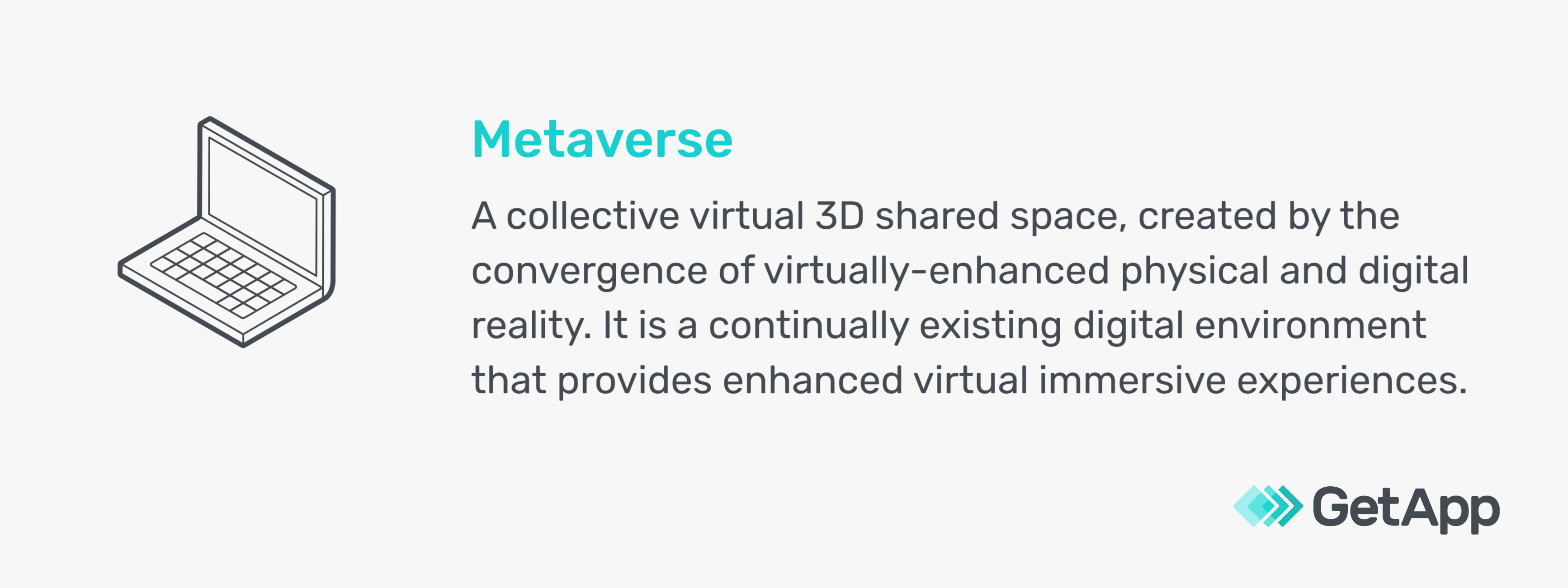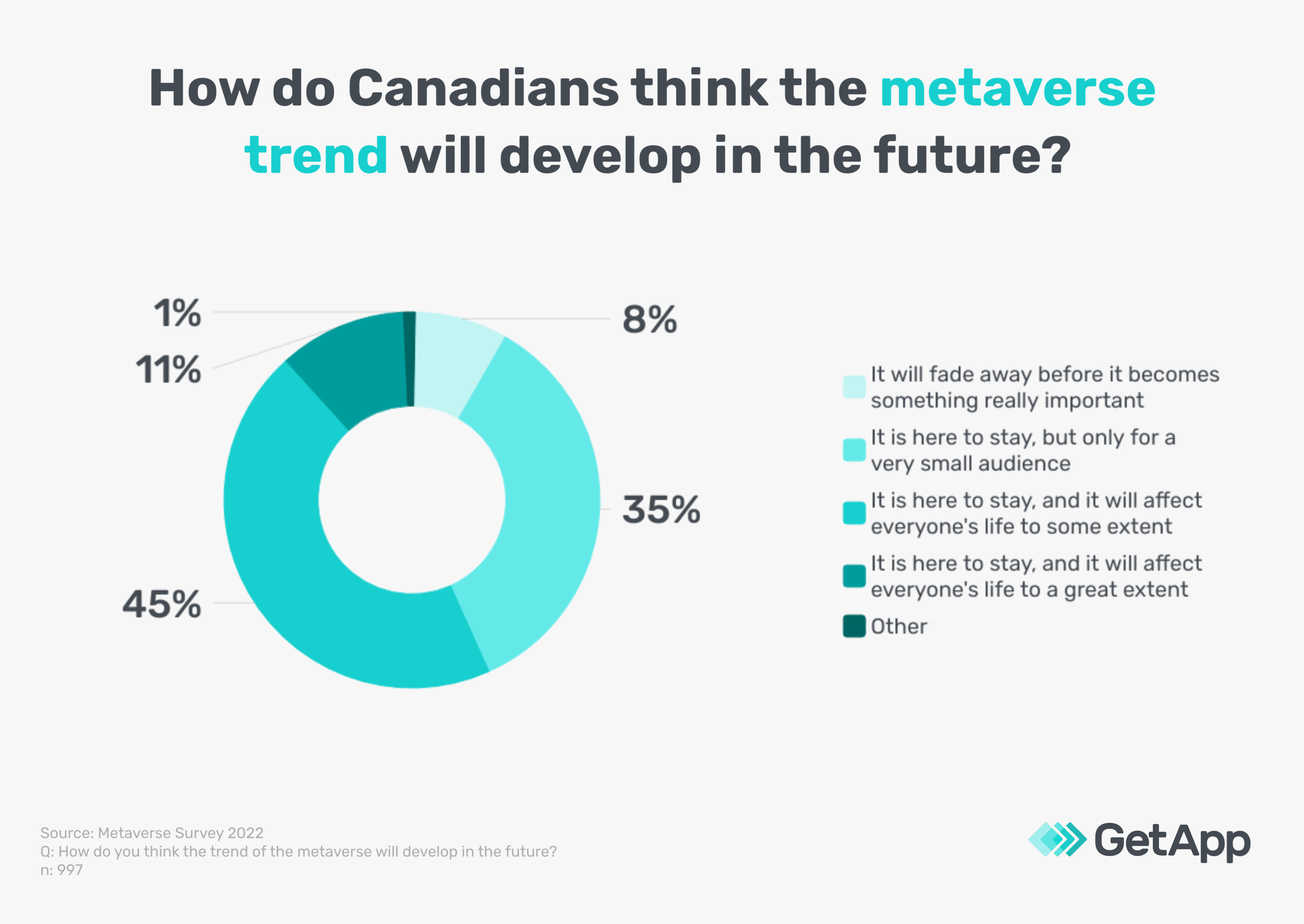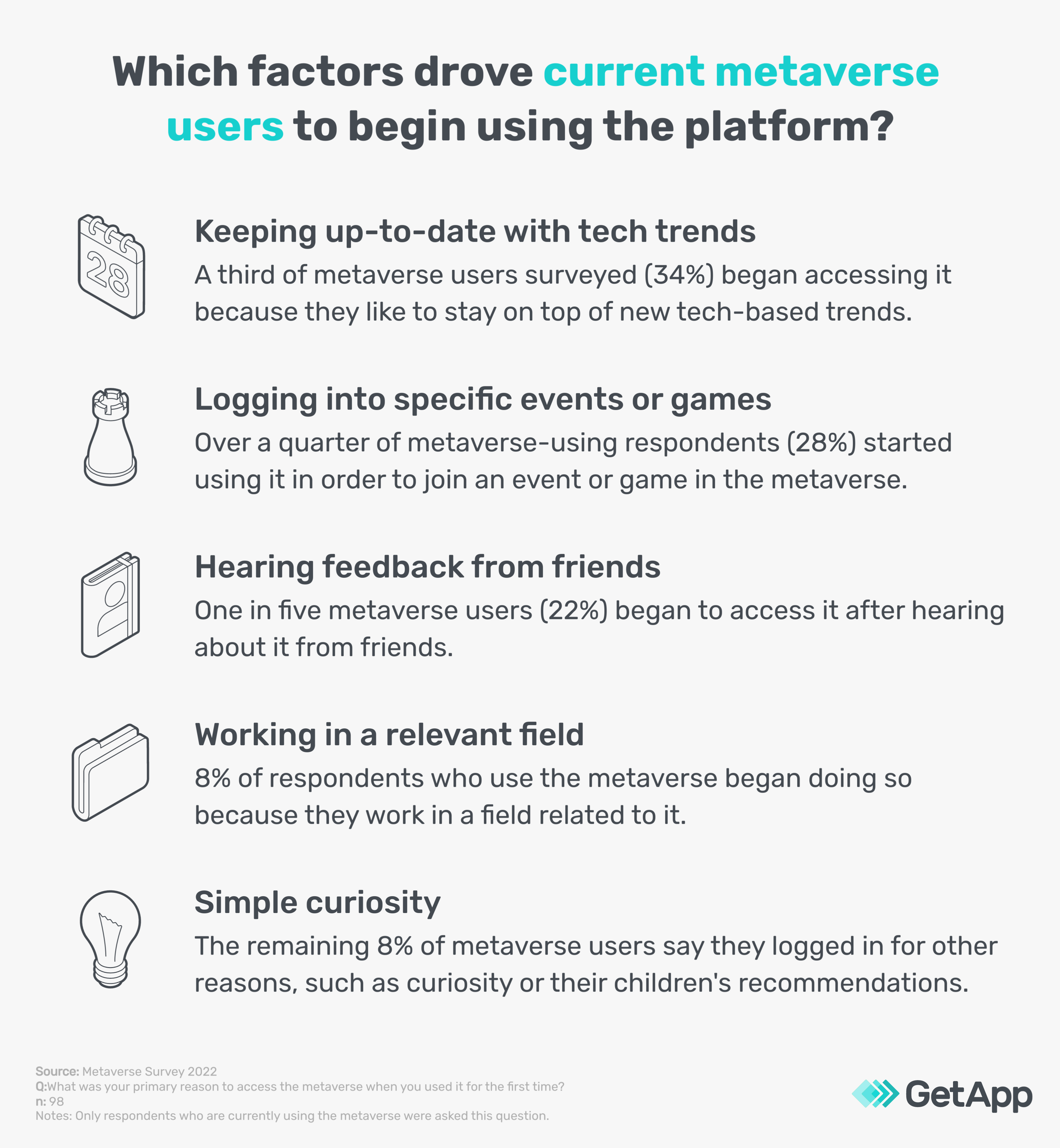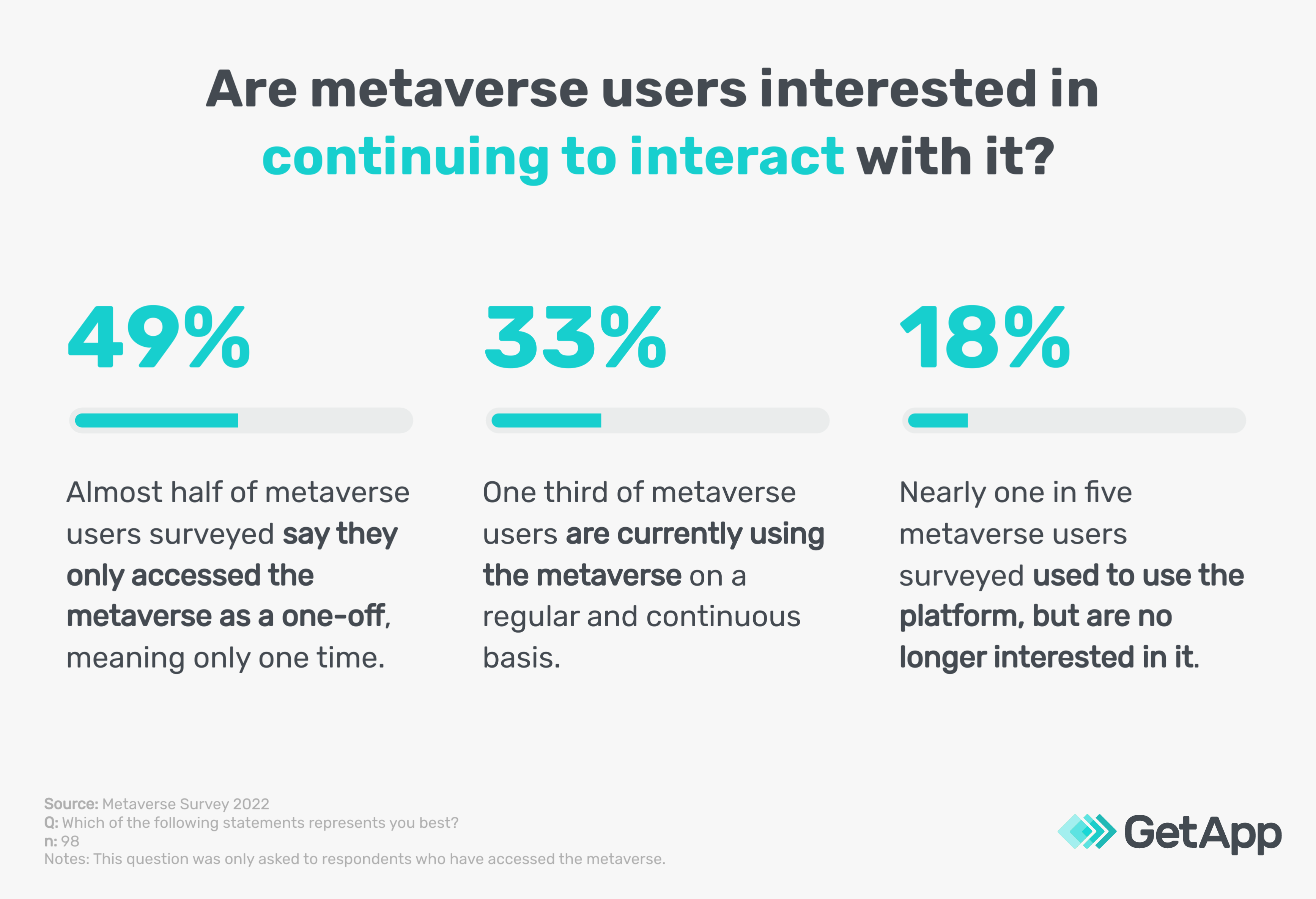We might have heard of the metaverse, but is anyone actually using it? And should brands start buying in? We surveyed 1,000 people in Canada to find out.

What we will cover
When Facebook changed its name to Meta in late 2021, the web 2.0 giant sent a clear signal that it was going all in on the metaverse and Web3 —the next generation of the internet. Throughout 2022, it was hard to escape talk of the metaverse. The term made it to the final three of the Oxford English Dictionary’s word of the year roundup, and commentators, consultants, and journalists all scrambled to make sense of this emerging concept.
But despite the hype, the metaverse is still in its infancy, and both consumers and brands remain unsure of its potential. Can small to midsize enterprises (SMEs) already take advantage, or is it reserved for corporations with giant tech and marketing budgets?
To find out more, we asked nearly 1,000 Canadian consumers about their views on the metaverse, how they use it, and where they see its potential. In this article, we explore overall attitudes and adoption patterns, and take a look at some of the technologies behind it, like artificial intelligence. In part two we will focus on the metaverse as it relates to eCommerce. You can scroll down to the bottom of this article for a full methodology.
What is the metaverse?
For the purposes of our survey, we defined the metaverse as:

The idea of the metaverse dates back to the 1990s, but the concept has seen a recent resurgence thanks to various enabling technologies, which have all reached maturity at a similar time.
Gartner offers a more detailed examination of what the metaverse is, its component technologies, and where it might be headed, but it may be useful to think of multiple metaverses at this point, aspects of which might already be familiar. These include virtual workspaces, online gaming worlds where people ‘live’ as a digital twin of themselves and interact with other characters, and VR-based training environments, where people use virtual replicas of complex and expensive equipment in a relatively low-risk and low-cost environment.
Did you know? Several crucial technologies have advanced to the point where it is possible to build the online worlds that make up a metaverse. SMEs that want to take advantage should be familiar with these.
- Artificial intelligence (AI) has several roles in the metaverse. It can power the automated services and characters that users might interact with, can generate the buildings and scenery of an online environment, and is used to process natural human language and convert it into code that machines can understand.
- Virtual reality software allows brands to create immersive experiences, often in conjunction with specialized consumer equipment like headsets. Users can enter virtual realms to play games, visit digital replicas of real-world places, or attend online events.
- In the digital world, brands and consumers might want a reliable record of who owns virtual assets. These can include everything from cryptocurrencies to the clothing that their digital characters (‘avatars’) wear. Blockchain software helps prove ownership by providing a public, fixed (‘immutable’) record.
- A metaverse can bring together people from all over the world to socialize, work, and learn. Online training software is nothing new in itself, but the metaverse offers new opportunities to make these experiences more immersive and connected to other aspects of one’s digital life.
Metaverse hype cannot mask consumer uncertainty
Confusion —or a lack of full understanding— about the metaverse seems to be common. Only 38% of the participants in our survey said they knew exactly what the term meant before being shown the above definition. 18% were familiar with the concept (but not the name), while 33% were familiar with the name (but not the concept). A further 12% said they weren’t familiar with either the name or the concept before taking part in the survey.
Despite inspiring the new strategic direction (and name) of the company behind the world’s most popular social network, consumers in our survey were not certain about what the metaverse could mean for them or how it will develop in the next few years.
General sentiment towards the metaverse was mixed. A plurality in our survey (40%) said they felt neutral about it, but more felt positive about the metaverse overall (39%) than negative (21%).
A large majority (90%) accepted that the metaverse is here to stay, but respondents did not agree on what this means, exactly. Just over one-third (35%) of survey participants thought that the metaverse will remain significant, but only for a very small audience. Nearly half (45%), however, said they think that it will affect everyone’s life to some extent, while 11% said that it will have an even larger impact on everyone’s life.

Uncertainty acts as an outright blocker to the metaverse for many potential users. Of those who have not yet used the metaverse but are interested in doing so, their reasons for not yet accessing it were largely based around lack of knowledge. 41% said they don’t know how to access it, 20% believed the metaverse isn’t fully developed yet, and 17% said they wouldn’t know what to do when they got there.
Why are people interested in the metaverse?
As of late 2022, metaverse adoption seems to be low in Canada. In our survey, only 10% of respondents said they had accessed it. However, there is still significant curiosity: another 53% say they would be interested in using the metaverse, while 38% said they had never done so and have no interest in the future.
The metaverse promises a highly flexible online platform, and the technologies to take advantage of this are still in their early days. There are therefore many potential use cases for companies who are willing to experiment with new business models.
More than one-third of respondents (34%) who had accessed the metaverse did so because they like to keep up to date with tech trends, and a further 28% did so because they wanted to join a specific event or game. 22% said they were curious to try it because they heard about it from friends.

Gaming was the most commonly cited activity that drew people toward the metaverse in our survey. 60% of metaverse users said they have done this, far ahead of other activities like social interaction with others (34%), attending a virtual event (20%), and training or courses (17%).
Moreover, 39% of metaverse users in our survey said they have used it to make a purchase. The most popular items were digital, including virtual games that are only accessible in the metaverse (bought by 50% that had made a metaverse purchase), virtual products, such as clothes for their online avatar (bought by 45%), and cryptocurrencies (29%). Related to the above, 75% of metaverse users said that personalizing their avatar is somewhat or very important.
SMEs may be interested to learn that nearly half of those who have accessed the metaverse did so as a one-off, perhaps to access one specific game, event, or service. This suggests that metaverse users need a compelling reason to access the platform that goes beyond the novelty of the platform itself.
The data here suggests that metaverse users in 2023 represent the classic early adopters. They are tech enthusiasts who like to try new things, enjoy gaming, and are open to spending money on virtual assets that they can use online. Their social lives —whether online or in-person— may lead them towards the metaverse because that’s where communities, games, and events are moving— at least some of the time.
Is 2023 the year the metaverse goes mainstream?
The people in our survey that have used the metaverse so far appear to like it. 57% said they were somewhat satisfied, and 24% were strongly satisfied with the experience so far, making for an 81% overall satisfaction rate.
But in order to answer whether the metaverse will grow, we need to look at the 90% of people who have not yet used it. Among current non-users who are interested in the metaverse, 68% say they are simply curious, while 41% are interested in potential unique or exclusive experiences, and 32% see some value in the metaverse as a social platform.
Continuing the theme, this group would be more drawn to the metaverse for socializing than for gaming or other specific activities that appeal to current users. In fact, non-users have a broader range of potential interest in the metaverse than current users overall.

However, from our survey, it looks unlikely that the metaverse will see a large surge in users. Among the 10% who have used it, less than one-third describe themselves as ‘currently using the metaverse’. Whatever people are accessing the metaverse for, they do not seem to be sticking around. Unless numbers grow exponentially, it seems unlikely that a majority will be using the metaverse any time soon.

In summary
The data in our survey suggests that the metaverse may be suffering from a classic chicken-and-egg scenario. Many users stay away from a platform because they don’t fully understand it and there’s no compelling reason to dive in. Meanwhile, brands stay away because they don’t feel there is a big enough audience for their content.
Current users tend to come to the metaverse for one-off events or experiences, but they have a high bounce rate. The potential users of the future, however, are more curious and could be attracted by opportunities to socialize, shop, and play.
In part two of this exploration of our survey data, we look at how consumers view the metaverse as a shopping platform and how brands might want to adapt their eCommerce strategies as the metaverse develops.
Methodology
GetApp's data was gathered through an online survey conducted in October 2022 in which we surveyed 997 people residing in Canada, aged 18 to 75, from all regions of the country.
To participate in the study, respondents had to read a definition of what metaverse is and validate their understanding of the concept in a subsequent question.
The results are representative of the survey, but not necessarily of the population as a whole.
